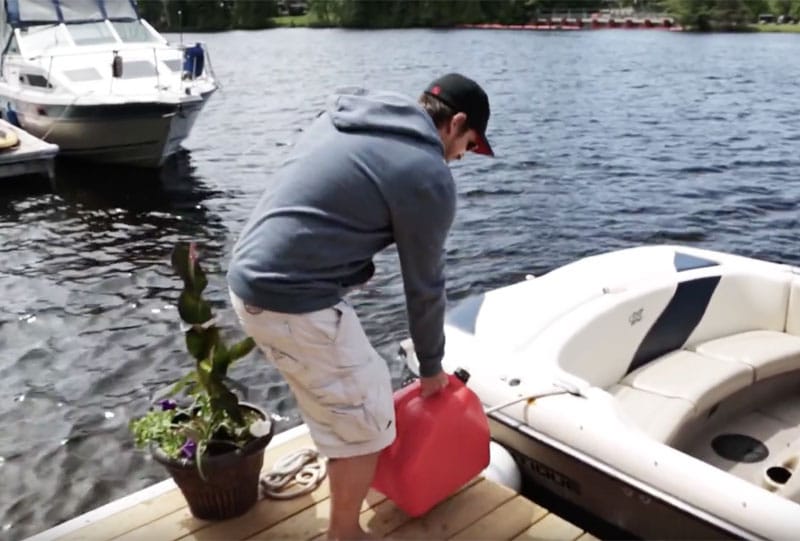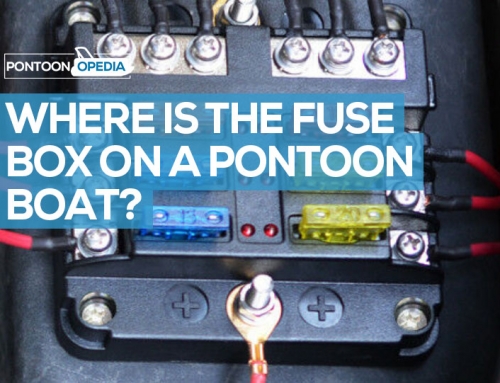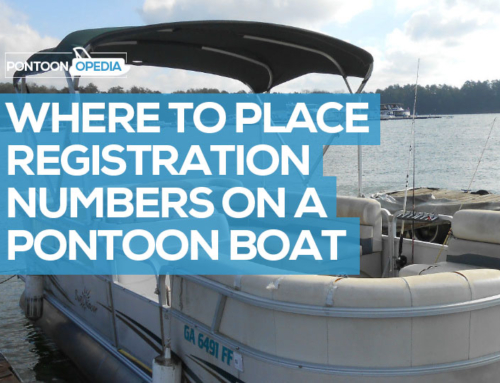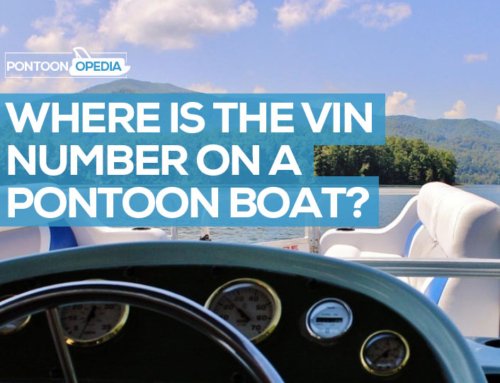Before I bought my first pontoon boat in 2016, one thing that I had no idea about was how much gas I would be using. It’s an important consideration but so often overlooked as a future expense. I spent some time researching online before I made my purchase, and here’s what I found out.
Slower pontoon boats will not use as much fuel as quick motorboats. Your potential gas consumption could be as low as 5 gallons an hour with a smaller horsepower engine. If you use your boat for five hours weekly, that could equate to around $3,000 dollars a year on fuel with current 2018 prices.
Now obviously the answer above to how much fuel or gas a pontoon boat uses isn’t hard, fast, or always accurate as there are many different factors coming into play that could affect your fuel consumption.
Contributory factors include:
- What condition your motor is in, and the specification
- How much weight you are carrying on board
- How fast you push your pontoon
- How clean the tubes can be, e.g. are they covered in algae?
- How much resistance is under the boat
In all honesty, pontoon boats are not that gas or fuel efficient. It takes a lot of power to push two logs (tubes) through water as you can probably imagine!
Table of Contents
Examples of Pontoon Gas and Fuel Consumption
I looked into the most popular outboard motor types that you will typically find on pontoon boats and looked into how many gallons per hour in fuel they would consume. Here’s what I found out.
- Evinrude Etec 50 HP – 4.55 gallons per hour
- Evinrude Etec 75 HP – 6.80 gallons per hour
- Evinrude Etec 90 HP – 7.70 gallons per hour
- Evinrude Etec 115 HP – 10.7 gallons per hour
- Evinrude Etec 150 HP – 15.1 gallons per hour
- Evinrude Etec 300 HP – 25.9 gallons per hour
- Mercury 50 efi – 4.65 gallons per hour
- Mercury 75 efi – 7.60 gallons per hour
- Mercury 90 efi – 10.0 gallons per hour
- Mercury Verado 175 Efi – 17.8 gallons per hour
- Mercury Verado 250 Efi – 26.1 gallons per hour
- Yamaha 70 HP – 7.30 gallons per hour
- Yamaha 90 HP – 9.10 gallons per hour
- Yamaha 115 HP – 9.70 gallons per hour
- Yamaha 150 HP – 15.5 gallons per hour
- Yamaha 250 HP V6 – 23.8 gallons per hour
- Yamaha 350 HP V8 – 34.1 gallons per hour
What Other Pontooners Say
I also canvassed the opinion of other pontooners to ask them how much gas their own boats used, and what set-up they had. The answers below should give you some great insight into the different models and specs.
“I used to own a 22-foot pontoon with a Yamaha 50 HP engine. I was burning through around 5 gallons an hour at my top speed of 18 miles per hour.”
“With a 90 HP Yamaha performance motor on a 22-foot pontoon I see 4.2 miles per gallon, and 3.6 gallons per hour. So, at around a trolling speed of 3 miles per hour, you would be using something like 7.5 miles per gallon.”
“With a 115 HP Honda on my 23-foot Sylvan pontoon I burn through half a tank of gas in a 4-hour trip with three large male passengers on board. That’s running at around 3,500 revs per minute.”
“Our 115 HP Mercury use something like 6 gallons every three quarters of an hour at 3,000 revs per minutes. It’s a 2-stroke model.”
My 21-foot party barge has a 75 HP Mercury with a 24-gallon tank. If we’re running at 3,600 revs per minute, then that’s half a tank of gas gone every three or four hours on the water. That means we use something like one and half tank’s of gas on a three day long weekend out.”
How Do I Calculate Fuel Consumption?
Understanding how much gas your pontoon is using is relatively simple, and I use a calculation to do so.
All you do is divide your distance travelled by the litres of fuel you have used. That will give you the miles to litre ratio.
You then convert the miles per litre figure to litres per 100 miles. In other words, you divide 100 by the miles per litre number you have.
To find out how much this is in gallons, you then multiply the miles per litre number by 2.825.
I also use a GPS device to measure my distance and speed. There are plenty available online, with Garmin devices being very good.
Here’s a table which gives you all the different calculations that you might want to use – I hope you find it helpful.
| What Do You Want Convert? | What You Need to Calculate |
|---|---|
| km per litre to litres per 100 km | divide 100 by km per litre |
| km per litre to miles per gallon | multiply km per litre by 2.825 |
| litres per 100km to miles per gallon | divide 282.5 by litres per 100km |
| miles per gallon to litres per 100km | divide 282.5 by miles per gallon |
| litres per 100km to km per litre | divide 100 by litres per 100 km |
| miles per gallon to km per litre | multiply miles per gallon by 0.354 |
| km to miles | multiply km by .62137 |
| miles to km | multiply miles by 1.6093 |
| gallons to litres | multiply gallons by 4.546 |
| litres to gallons | multiply litres by .21997 |
How to Save Pontoon Boat Gas and Fuel
If you’re like me, I am always looking for ways in which I can reduce my fuel consumption and get more mileage out of my boat. Given the price of gas today, it makes sense. I’d rather be spending that money on fishing accessories than expensive fuel.
Handy Hint: Previously on Pontoonopedia I have written at length on how you can use less fuel, and you can read that guide in the fuel economy guide.
If you don’t have time to read that, then here are my 6 top tips on how to save gas when owning a pontoon boat:
- Maintain your pontoon boat’s engine regularly
- Estimate how much fuel you use – you might be shocked
- Find your boat’s sweet spot for optimum fuel consumption
- Distribute weight evenly across the deck
- Tune up your propeller a couple of times a year
- Try to reduce drag and take off excess load weight
- That includes dropping the Bimini top to lessen resistance
- Learn to use your trim tabs properly
Where to Buy Gas for a Pontoon Boat?
It really depends on what type of motor you are running, and whether it’s gasoline or propane. One thing I have learned though, is that the marina I pontoon from sell gas, but put a massive mark-up on it.
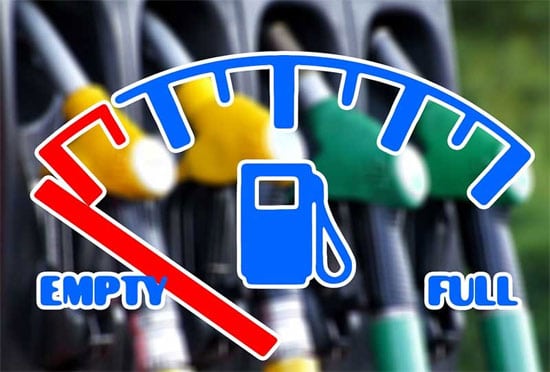
Make sure you don’t run out of gas… it can be very embarrassing!
They know that many boat owners don’t have much of a choice, so seem to be able to hike their prices up.
I don’t buy gas from them though, but instead from my local service station. It’s far cheaper.
All I do us fill up a gas caddy (here’s the one that I use), and then use that to fill my fuel tank up. It’s so much cheaper than buying gas from the over-priced marina guys.

